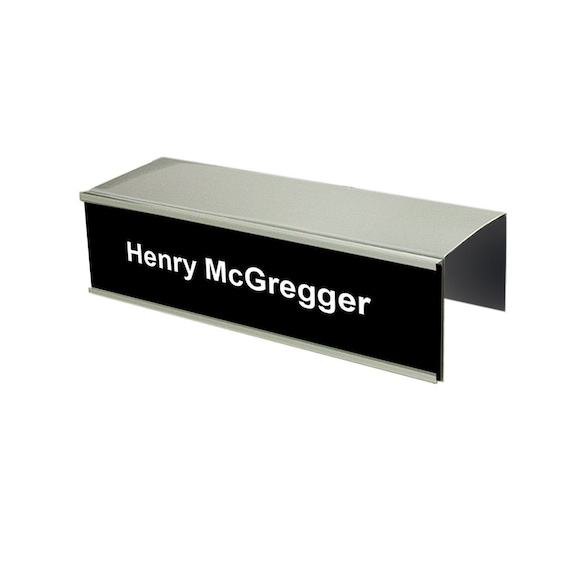Why Plastic Nameplates Are Essential for Modern Branding Strategies
Why Plastic Nameplates Are Essential for Modern Branding Strategies
Blog Article
How Plastic Nameplates Are Manufactured: A Comprehensive Overview to Their Manufacturing Refine
The manufacturing of plastic nameplates entails a number of accurate steps, beginning from the option of ideal materials to the final complements. Each stage is crucial, guaranteeing the item fulfills certain needs for sturdiness and visual appeals. Numerous production methods play a substantial function in crafting these nameplates. Understanding these processes can clarify the intricacies behind what could appear like an easy item. What aspects add to the high quality and customization of these nameplates?
Comprehending Plastic Products Used for Nameplates

The Layout Process: From Idea to Prototype
The design process for plastic nameplates starts with a clear concept that overviews the overall production. Designers team up with clients to define the purpose, design, and details requirements of the nameplate. This preliminary stage consists of conceptualizing sessions, sketching concepts, and choosing colors and fonts that line up with branding goals.Once the principle is established, developers use computer-aided style (CAD) software application to produce thorough electronic representations. These models enable for visualization and modifications before moving on. Responses from stakeholders is essential during this phase, as it helps fine-tune the style to satisfy expectations.After finalizing the digital prototype, a physical model may be created, commonly through strategies like 3D printing. This substantial representation enables additional assessment of aesthetics and performance. On the whole, the style procedure is a vital step that lays the structure for the effective manufacturing of top notch plastic nameplates.
Reducing and Shaping the Plastic
In the cutting and shaping phase of plastic nameplate production, the selection of materials plays a crucial role in identifying the end product's top quality and toughness (Plastic Nameplates). Different accuracy cutting techniques, such as laser cutting and CNC machining, guarantee that the plastic is formed with accuracy and consistency. This mix of mindful product choice and advanced reducing approaches is important for creating premium nameplates

Product Option Process
Picking the best material is important for producing top notch plastic nameplates. Different sorts of plastics are readily available, each offering distinct advantages and characteristics. Typical choices include acrylic, polycarbonate, and PVC. Acrylic is favored for its clearness and UV resistance, making it suitable for exterior applications. Polycarbonate, known for its durability and effect resistance, is suitable for settings that require improved defense. PVC is often picked for its cost-effectiveness and adaptability in design. The choice procedure additionally thinks about variables such as shade, surface area, and density finish, which can significantly affect the last appearance and capability of the nameplate. Eventually, the chosen material needs to align with the intended usage and visual goals of the plastic nameplate.
Precision Cutting Strategies
While selecting the suitable material prepares, precision cutting strategies play a vital duty fit the plastic nameplates right into their final forms. Numerous approaches, consisting of laser cutting, CNC milling, and pass away cutting, are used to achieve precision and uniformity. Laser cutting makes use of focused light to create clean edges and intricate layouts, suitable for complicated patterns. CNC milling offers flexibility by removing excess material with precision, fitting numerous densities and forms. Pass away cutting, on the other hand, enables mass manufacturing of consistent pieces, boosting effectiveness. Each strategy is chosen based upon the style requirements and the wanted finish, guaranteeing that the end product fulfills high quality requirements and consumer assumptions while maintaining durability and visual appeal.
Printing Techniques for Customization
Exactly how can producers attain accurate and vibrant styles on plastic nameplates? The response depends on various printing strategies tailored for modification. Digital printing has gained popularity due to its ability to generate complex designs and high-resolution pictures straight onto plastic surfaces. This approach permits for quick turn-around times and minimal arrangement prices, making it suitable for short runs and personalized orders.Screen printing remains one more extensively used technique, specifically for larger quantities. It involves developing a pattern and using layers of ink, leading to rich shades and durability. UV printing, which utilizes ultraviolet light to cure the ink, is also efficient, offering excellent adhesion and resistance to fading.Additionally, pad printing uses adaptability for irregularly shaped nameplates, permitting comprehensive styles on tough surfaces. These printing approaches enable producers to fulfill diverse customer requires while ensuring quality like it and durability in their plastic nameplate products.
Surface Treatments and Finishing Options
,aspect=fit)
Quality Assurance Measures in Manufacturing
Guaranteeing the highest standards of quality assurance throughout the production of plastic nameplates is important for maintaining item integrity and customer complete satisfaction. Producers apply strenuous assessment methods at various stages of the manufacturing procedure. Raw products undergo comprehensive screening to confirm they fulfill specs for sturdiness and color uniformity. Throughout the molding stage, automated systems monitor parameters such as temperature level and pressure to avoid defects.In addition, aesthetic inspections are carried out to recognize any kind of surface flaws or imbalances. As soon as the nameplates are generated, they undergo useful tests, including attachment examinations for published elements and stress examinations for longevity. Quality assurance teams usually use analytical sampling approaches to examine batches, seeing to it that any variances from criteria are without delay dealt with. This detailed strategy not only boosts product top quality but additionally promotes depend on with clients, verifying the producer's commitment to excellence in every nameplate produced.
Product packaging and Circulation of Finished Nameplates
The product packaging and distribution of ended up plastic nameplates are essential actions in ensuring they reach clients in excellent problem. Various product packaging products are picked to shield the nameplates during transit, while shipping techniques are very carefully chosen based on efficiency and cost-effectiveness. In addition, efficient storage space options are carried out to keep quality until the nameplates are provided.
Packaging Products Utilized
Picking suitable packaging materials is essential to guarantee their defense throughout transit when distributing completed plastic nameplates. Generally utilized materials include bubble wrap, foam cushioning, and cardboard boxes, all made to support the nameplates against shocks and effects. Bubble cover offers a flexible obstacle, while foam cushioning guarantees that nameplates continue to be safely in place, minimizing the threat of scrapes or breakage. In addition, strong cardboard boxes are utilized to contain the nameplates, offering structural assistance and protection from exterior components. Labels may be used to show managing guidelines or fragile materials, additionally enhancing security during transportation. On the whole, using high-quality product packaging materials significantly contributes to the integrity and discussion of the finished plastic nameplates upon arrival at their destination.
Delivering Approaches Used
Effective circulation of completed plastic nameplates depends on numerous shipping approaches that assure safe and secure and prompt distribution. Companies usually utilize copyright services, freight shipping, and post offices, depending upon the dimension, weight, and destination of the packages. For neighborhood shipments, copyright services give quick transit, guaranteeing nameplates get to consumers swiftly. For larger orders, freight shipping is favored, utilizing trucks or delivery containers to move bulk quantities efficiently. Postal services act as an economical option for smaller sized deliveries, specifically for residential shipments. All shipping methods prioritize safety packaging to stop damages throughout transportation. Tracking systems are additionally used to keep an eye on shipments, offering customers with real-time updates and reassurance relating to the status of their orders.
Storage Solutions Implemented

Frequently Asked Concerns
What Sorts Of Companies Typically Make Use Of Plastic Nameplates?
Plastic nameplates are commonly used by different companies, consisting of workplaces, health centers, read the full info here factories, and institutions. These nameplates serve vital functions such as identification, information screen, and branding, adding to business efficiency and specialist look across diverse environments.
For how long Does the Entire Production Refine Take?
The production procedure duration varies based on intricacy and amount, generally ranging from a few days to numerous weeks. Aspects influencing this timeline include style authorization, product availability, and manufacturing methods used by the company.
Can Plastic Nameplates Be Recycled After Usage?
Plastic nameplates can be recycled, supplied they are made from recyclable products. However, the accessibility of reusing programs and neighborhood regulations may impact their recyclability. Proper disposal practices are vital to assure efficient recycling.
What Are the Ecological Effects of Plastic Nameplate Manufacturing?
The ecological influences of plastic nameplate production include carbon emissions, resource deficiency, and contamination from producing processes. Plastic Nameplates. Additionally, improper disposal adds to plastic waste, adversely impacting ecological communities and wild animals, highlighting the need for lasting practices
Are There Any Type Of Security Interest In Plastic Nameplates?
Security problems regarding plastic nameplates primarily entail potential chemical exposure throughout manufacturing and the threat of products breaking down over time, which might bring about hazardous substances being launched, impacting both human health and the environment. While various products can be used for nameplates, plastic remains a preferred selection due to its adaptability and resilience. In the cutting and forming phase of plastic nameplate production, the choice of materials plays an essential duty in figuring out the final item's high quality and sturdiness. Selecting the right product is necessary for producing top quality plastic nameplates. While choosing the suitable product lays the groundwork, precision cutting methods play a necessary duty in shaping the plastic nameplates right into their final forms. When dispersing completed plastic nameplates, picking proper packaging products is vital to guarantee their security throughout transit.
Report this page